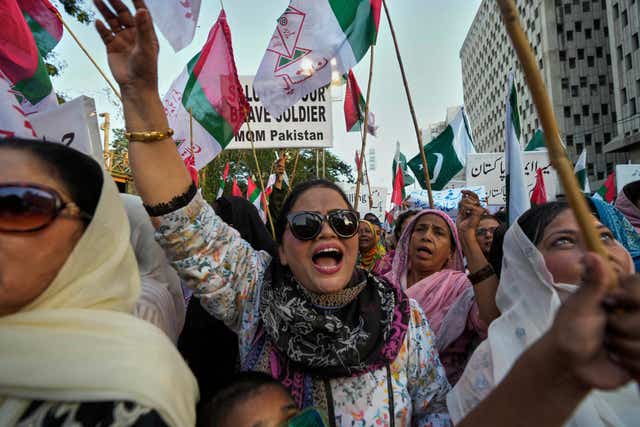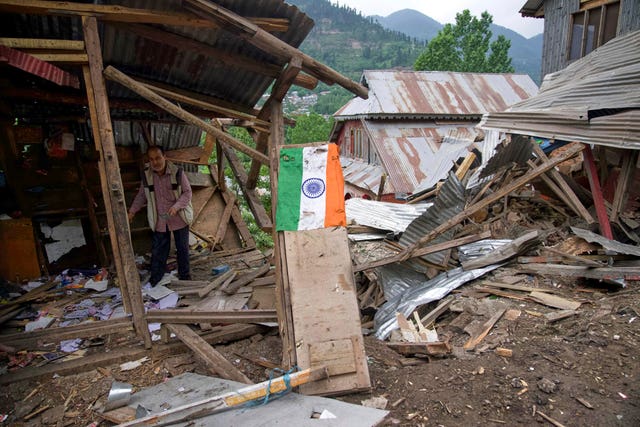Pakistan denies Indian accusations of attacks on military bases
Both sides have traded heavy fire across their frontier in disputed Kashmir.

Pakistan has denied Indian accusations it has attacked military bases amid the growing conflict between the two neighbours.
India’s Headquarters of the Integrated Defence Staff, a central coordinating arm for all Indian armed forces, said military stations in Jammu, Udhampur and Pathankot were targeted by Pakistan using missiles and drones. It said the attacks were repelled and no casualties were reported.
Shesh Paul Vaid, the region’s former director-general of police, said the Jammu Airport likely was also under attack and that some of the 50 loud explosions he heard likely were because “our defence system is at work”.
Jammu and Udhampur are close to the Line of Control, the de facto border that divides the Kashmir region between India and Pakistan. Pathankot is in India’s Punjab state.

Sirens were also heard in some parts of the region’s main city of Srinagar, residents said. It was followed by a blackout in the city and other parts of the region.
Pakistan’s Ministry of Foreign Affairs in a statement rejected the Indian claims that Pakistan launched attacks on Pathankot, Jaisalmer and Srinagar, saying “these claims are entirely unfounded, politically motivated, and part of a reckless propaganda campaign aimed at maligning Pakistan”.
It added that “such actions not only further endanger regional peace but also reveal a disturbing willingness to exploit misinformation for political and military ends”.
India fired attack drones into Pakistan on Thursday, killing at least two civilians, the Pakistani military said.
India acknowledged it had targeted Pakistan’s air defence system and accused its neighbour of attempting its own attack.
Islamabad said it shot down several of the drones while India said it “neutralised” Pakistan’s attempts to hit military targets. It was not possible to verify all of the claims.
The exchanges came a day after Indian missiles struck several locations in Pakistan, killing 31 civilians, according to Pakistani officials.
New Delhi said it was retaliating after gunmen killed more than two dozen people, mostly Hindu tourists, in India-controlled Kashmir last month. India accused Pakistan of being behind the assault. Islamabad denies that.

Both sides have also traded heavy fire across their frontier in disputed Kashmir, and Pakistan claimed it killed scores of Indian soldiers. There was no confirmation from India.
Pakistan’s Prime Minister Shehbaz Sharif has vowed to avenge the deaths in India’s missile strikes, raising fears that the two countries could be headed toward another all-out conflict. Leaders from both nations face mounting public pressure to show strength and seek revenge, and the heated rhetoric and competing claims could be a response to that pressure.
US Secretary of State Marco Rubio spoke on Thursday to the Pakistani prime minister and India’s External Affairs Minister Subrahmanyam Jaishankar, urging both sides to de-escalate the situation, the US State Department said.
New Delhi, meanwhile, accused Pakistan of attempting “to engage a number of military targets” with missiles and drones along the Line of Control that divides Kashmir and elsewhere along their border.
“The debris of these attacks is now being recovered from a number of locations,” it said.
At a news briefing, Pakistan’s Foreign Minister Ishaq Dar on Thursday rejected India’s claim that Islamabad carried out any attack in Indian Punjab.
“These accusations are an attempt to incite anti-Pakistan sentiment among the Punjabi Sikh population in India,” he said.
Pakistani Information Minister Attaullah Tarar told parliament that so far, Pakistan has not responded to India’s missile attacks, but there will be one. Later Thursday, Indian authorities ordered a night-time blackout in Punjab’s Gurdaspur district, which borders Pakistan.





